21 Jul 14 | About Index, ArtFreedomWales, Events, News and features
Index on Censorship’s ArtFreedomWales launched on Friday with the first online conversation about artistic freedom of expression in Wales with playwright Tim Price, singer, actor, writer Lisa Jen, poet and writer Kathryn Gray and visual artist Leah Crossley – though unfortunately we lost Crossley’s connection early on.
The live-broadcast, hosted by Julia Farrington (Associate Arts Producer Index) opened on the question: “How free do you feel to express yourself as an artist in Wales?”.
Price kicked off by talking about the constraints posed by the Welsh language. “We are a bilingual nation, but we [artists] are not all bilingual…There is a whole element of Welsh experience that isn’t available to me because I don’t speak Welsh.
Gray agreed, “language barrier blocks expression and collective understanding of our differences and similarities. This is disabling for the arts in Wales.”
Jen, whose first language is Welsh, moves comfortably between the two – singing in Welsh, writing plays in English – as this seems the most natural way to express herself. But there are massive problems “when you try and do things bilingually like run a workshop in Welsh, and bilingualise it – then it’s impossible. English always oppresses the Welsh”.
Our next broadcast in Welsh in August 1st, will look specifically at the opportunities for and obstacles to expression for artists working in Welsh.
Price also stressed that for most people access to opportunities to express themselves through the arts is the greatest obstacle of all. The panellists all agreed that this was as much to do with a “collective low self-esteem across the country” or as Jen put it: “Whether you are a Welsh language speaker or not, we are a flipping insecure nation.” Price said that the most common problem he finds when he runs writing workshops “is that many people believe that no one can possibly be interested in what we have to say.” The legacy of being England’s oldest colony and Westminster’s failure to invest in infrastructure, were cited as contributory causes.
Other obstacles discussed included self-censorship – how cultural institutions and the subsidy culture influence what is sayable, the imbalance between the considerable support for poets and the lack of support for playwrights who want to make the big step into the professional arena. Gray also pointed to the Welsh media’s lack of critical engagement on an artistic or political level that “would help people to understand the regime we are living under”.
There were strong positives too – the support for emerging artists, a great DIY culture amongst fellow artists at grassroots level, new cultural infrastructure – and the acknowledgement that Wales was an exciting place to be an artist now. Jen: “We have freedom to do whatever we want but few playwrights are making big, political work with a big massive voice.” She went on to say that there is no shortage of issues for Welsh artists to make work about but “we are playing safe. I am sick of seeing safe work that doesn’t tell me anything. I want to feel scared, feel danger.” Gary agreed, “Art should be about smashing things up. May things come from the ruins.”
But is there an appetite for more courageous, challenging work amongst the audience? The panellists agreed that the audience in Wales is innately conservative – the fact that Radio Cymru said that Jen’s music was not suitable for daytime listening is evidence of this – has to be taken into account. As Price said “We are a nation under siege from England, so culture remains about preserving and sustaining what we have.”
Follow and participate in the discussions @artfreedomwales.
Find out more about Index’s UK arts programme.
This article was posted on July 21, 2014 at indexoncensorship.org
21 Jul 14 | Mapping Media Freedom, Netherlands, News and features
Separatists in East Ukraine threatened journalists reporting on the Malaysia Airlines MH17 disaster. The plane was downed on Thursday 18 July killing 298 people, including 193 Dutch citizens.
Writing for The Daily Beast, Anna Nemtsova and two colleagues were detained at the morgue by separatists.
On Monday 21 July, Rudy Bouma, a reporter for the Dutch TV broadcaster Nieuwsuur, took photos of rebels carrying weapons at the train station in Donetsk. The separatists controlled the train that was carrying the bodies of the victims.
More reports from The Netherlands via mediafreedom.ushahidi.com
Journalist denied entrance to public court hearing
‘Rules for using drones by journalists too restricted’
Journalists’ cameras seized by police
Dutch magazine on trial for photographing princess
This article was posted on July 21, 2014 at indexoncensorship.org
18 Jul 14 | Events
Index on Censorship is delighted to announce the first two events in a series of online conversations about artistic freedom of expression in Wales. They form part of our ArtFreedomWales programme looking at how artistic freedom is regarded, supported, debated and promoted across the arts sector, in the press, by the public, by funders and policy makers in the UK.
Wales as a centre for artistic freedom of expression – the opportunities and the obstacles.
Online conversation with Tim Price – playwright, Kathryn Gray – poet and writer, Lisa Jen – musician/actor/writer and Leah Crossley – artist.
What: ArtFreedomWales
When: July 18, 11am (BST)
Where: Take part in the Google Hangout here
Artists working in Welsh – opportunities and obstacles to expression
Online conversation with Arwel Gruffydd – Artistic Director Theatr Genedlaethol Cymru, and Bethan Parry Jones – broadcaster, journalist and writer.
What: ArtFreedomWales
When: August 1, 11am (BST)
Where: Take part in the Google Hangout here
Please note: this conversation will be in Welsh with an English summary at the end.
These are the first two of four events we are live-streaming over the summer in the lead up to a symposium in Cardiff at Chapter Arts Centre (expected in October) on artistic freedom of expression in Wales. You will be able to email and tweet questions to the panels during the discussion. We want to hear from everyone producing and participating in the arts in Wales who has something to say about freedom of expression. These discussions will inform the agenda for a symposium in Cardiff and each will focus on a different theme that we have identified through our initial research.
What are the issues in Wales? What are the opportunities? What are the obstacles? What has the right to freedom of expression got to do with Wales’ major cultural debates and policies – bi-lingualism, engaging young people and ethnically diverse voices, tackling poverty, maximising on new cultural infrastructure, having an international voice?
Last year we held a conference in London ‘Taking the Offensive’ which identified and debated the social, political or legal controls that shape the cultural landscape. (Read the full report here.) We held a symposium in Belfast in May exploring these issues in Northern Ireland. (The report is due shortly.)
We want to engage with everyone who is interested in this subject. Welsh translations of all our key messages and information will be provided. Given the limitations of the budget we cannot make this a fully bilingual project, but we will ensure that Welsh speaking artists are involved in all aspects of the programme and translation is available.
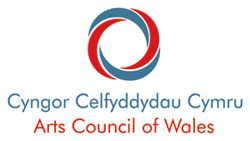
Arts Council of Wales supports this programme
18 Jul 14 | Mapping Media Freedom, Netherlands, News and features
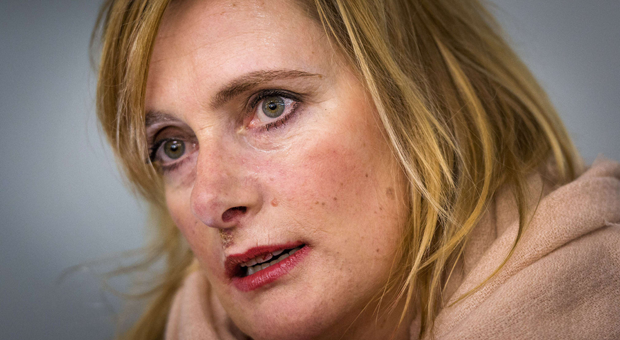
Rena Netjes
Dutch journalist Rena Netjes was sentenced in absentia to ten years in prison in Egypt. The Egyptian government’s case against her and other journalists generated media interest from around the world. With the help of her colleagues at the Dutch Union for Journalists she’s now raising the issue of human rights and press freedom violations in Egypt in The Netherlands and abroad.
When freelance correspondent Netjes arrived at Schiphol airport on the 4th of February this year, she had just slipped out of Egypt after finding out she was blacklisted by the Egyptian government and would have to stand trial for on charges of working for Al Jazeera, terrorism and endangering national security. At home in The Netherlands, she recounted her escape with the help of Dutch diplomats in Egypt to newspapers and television in what seemed like a media circus.
While Netjes managed to flee Egypt, her colleagues were not so fortunate. Three Al Jazeera journalists, the Canadian-Egyptian Mohamed Fahmy, Egyptian Baher Mohamed and the Australian Peter Greste, have been sentenced to seven years, after being held in an Egyptian prison since December 2013.
In June, from the safety of her living room in The Netherlands, she learned that she has been sentenced to ten years in prison. She was convicted on the charges of spreading false information and promoting the banned Muslim Brotherhood. She was accused of working for Al Jazeera, which the Egyptian government claims promotes the views of the Muslim Brotherhood. Netjes says she only had coffee with the chief editor on one occasion. British journalists Sue Turton and Dominic Kane have also been sentenced in absentia to ten years imprisonment.
For Netjes, who lived and worked in Egypt for many years, the verdict means she might never be able to set foot in the country again.
“It’s still an emotional roller coaster,” she told Index on Censorship. She’s relieved to be free but is concerned about her colleagues now. “It’s hard to imagine these guys are in prison, in the hands of sadists.”
Her career as a foreign correspondent in Egypt is over, for now at least. Netjes would run the risk of being arrested if she returned. She can’t even go to most countries in the Middle East because of extradition agreements. “Even Lebanon extradites ‘terrorists’ to Egypt”, she said.
With the spotlight on her in The Netherlands, Netjes said she sees an opportunity to generate attention for Egypt’s human rights violations, the lack of press freedom and specifically the plight of the other journalists, who weren’t able to escape prison sentences. “They now depend on international pressure, by politicians and diplomats behind the scenes, but also on awareness raised by colleagues around the world”.
Netjes speaks frequently to Dutch and international media and is invited to panel discussions and public human rights events. “I’m trying to turn this traumatic experience into something positive,” she said. “I have a more platform to explain what is going on Egypt, to raise the subject of the abuses in Egypt”.
The Dutch Union for Journalists (Nederlandse Vereniging voor Journalisten, NVJ) jumped in to support Netjes’ case and the campaign for free media in Egypt. On July 8, NVJ-President Marjan Enzlin paid a visit to the Egyptian embassy in The Netherlands to address the issue.
At the embassy Enzlin expressed her concern about the trial and her worries about the lack of freedom for media in Egypt. “We told him these verdicts are a strong violation of press freedom. We asked him to deliver this message to his president”, she told Index on Censorship. “He told us he is not in the position to intervene. And then he even lectured us on how western media is poorly informed and is deliberately spreading negative stories about Egypt. It was ridiculous”.
Enzlin acknowledges that without Netjes’ involvement, the case probably wouldn’t have generated so much attention in Dutch media and politics. “It is because of Rena that this case is so high on the Dutch agenda. But through Rena, we should now fight for the others. We as free journalists in a free country have to make noise about the case. We should be a thorn in one’s side”.
Being one of the highest ranked countries in terms of media freedom, Enzlin believes the Dutch media should stand up. “The resistance needs to come from here”, she said. “We are spoiled in The Netherlands. We see it as our duty to support and help our colleagues in countries like Egypt”.
Immediately after the verdict in Egypt, the Dutch Minister of Foreign Affairs Frans Timmermans summoned the Egyptian ambassador. The Dutch government insists the trial wasn’t fair, and urged Egypt to improve human rights. The NVJ wants to make sure this kind of diplomatic pressure won’t wane over time. “This requires long term commitment, we have to keep the pressure up”, Enzlin says.
The NVJ has several actions and protests lined up. They will publish a photo gallery on their website of all journalists who have been convicted in Egypt. They have sent a letter to the Egyptian ambassador in The Netherlands asking for assurances that Netjes can travel to the country for her appeal without fear of detention. If Netjes can’t go to Egypt safely, the NVJ requested to go in her place.
After the Dutch parliament’s summer recess, the NVJ will ask for another meeting with the Egyptian ambassador. They plan to invite MPs to join them to add more political pressure. The union will also organise a protest at Amsterdam’s Schiphol Airport, in front of the gate for flights to Egypt. “We will make banners saying ‘journalists are not terrorists’. Something Egypt will not be happy with.”
Netjes is still publishing stories on issues in Egypt. “I still have my sources in Egypt feeding me with information because they see that I am in the position to speak and write freely”. Meanwhile, spreading the word about the deplorable situation for journalists and activists in Egypt became a mission on its own.
“I am deprived of my freedom to travel, but that is nothing compared to what the guys who are imprisoned are going through”, she said. “I will not rest before they are free.”
This article was updated on July 21, 2014 to reflect that Marjan Enzlin is the President of NVJ, not Director as previously stated.
More reports from The Netherlands via mediafreedom.ushahidi.com
Journalist denied entrance to public court hearing
‘Rules for using drones by journalists too restricted’
Journalists’ cameras seized by police
Dutch magazine on trial for photographing princess
This article was posted on July 18, 2014 at indexoncensorship.org
18 Jul 14 | Macedonia, Mapping Media Freedom, News and features, Politics and Society
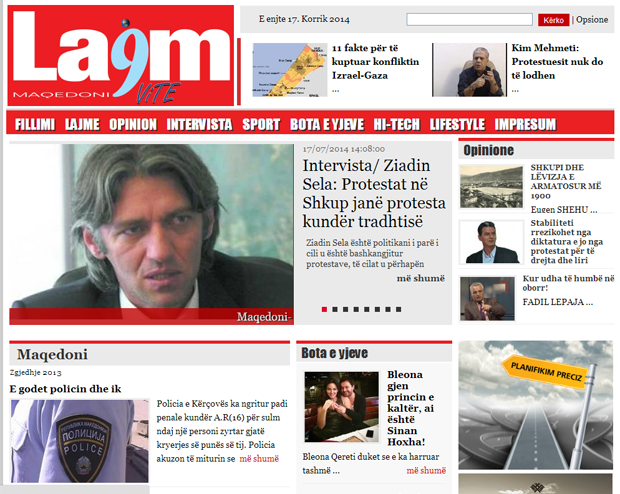
Besim Ibrahimi, intern for the Albanian-language newspaper Lajm, was arrested on Saturday, 5 July during a rally against the jailing of alleged extremist ethnic Albanian Muslims for the “terrorist” murders of ethnic Macedonians. The journalist was accused of taking part in the violent protests, while he was covering the rally under the instructions of his editor. Ibrahimi was released on Sunday, but the prosecutor has not yet decided if he will file charges against him or not.
“The policemen from the special units approached me and forced me to lie on the ground. When I told them that I am a journalist and I am here only to cover the protests, instead of releasing me, they beat me with batons and kicked me,” Besim Ibrahimi told Index few days after his prosecution.
“One of them told me ‘you’re not a journalist, you came here to protest’ and another was shouting ‘hit him, hit him’. And they just kept beating me until my glasses broke too. When they put me inside the vehicle, along with two other guys who were also treated inhumanely, they started using some hate language like ‘I will kill you Albanians’, ‘Albanian scum’”, he continued.
Ibrahimi spent 24 hours in the police station in Kisella Voda and was released on a promise to appear in court after a decision by the Court of Skopje. According to Ibrahimi, his case is currently under investigation and he aims to present evidence in order to withdraw the claim.
The Journalists’ Association of Macedonia, ZNM, strongly condemned the arrest of the young journalist and expressed its concerns “for establishing this extremely undemocratic practice in Macedonia of arresting journalists without having hard evidences.”
As Ibrahimi explained to Index, the Macedonian government controls almost the 90% of the media and the Albanian-language newspaper Lajm is targeted by the pro-government media. “They accuse us of fueling the protests. Albanians in Macedonia are facing state discrimination.”
The recent ethnic tensions in the country were raised when life sentences were handed down to six alleged Muslim radicals for the killing of five ethnic Macedonians at Orthodox Easter in 2012.
On Friday, July 4th thousands of protesters gathered outside the criminal court building in Skopje. According to media reports, the protests turned violent with the riot police firing tear gas, stun grenades and water cannon into the crowd and some protesters throwing bricks and rocks. Six people in total were detained and 20 police officers -as well as some protesters- were injured, the police reported.
Albanians make up a quarter of the country’s 2.1 million population.
More reports from Macedonia via mediafreedom.ushahidi.com
Police pressure journalists during protests in Skopje
Telma TV under government pressure
This article was posted on July 18, 2014 at www.indexoncensorship.org
17 Jul 14 | News and features, Politics and Society, Religion and Culture, United Kingdom

Three years ago this week, David Cameron announced that a public inquiry into phone hacking would be set up, under the guidance of Lord Justice Leveson.
It may be difficult to imagine now, given how acrimonious the fallout has been, but this was generally seen as a positive step. Something had gone very wrong, it seemed, in public life. Hacking was merely the embodiment of a secretive threeway between politicians, the Metropolitan Police and News International. A judge-led inquiry would clear the air, we hoped. No one, not even the people behind Hacked Off, (which, after all, was not set up to lobby for a new state-backed regulator, or for enhanced privacy, but merely for an inquiry) could have foreseen the impasse we are now at, with a ludicrous Royal Charter for press regulation, punitive press laws on the statute books, two proposed regulators (the industry’s IPSO and the pro-Royal Charter IMPRESS), and at least one paper, the Financial Times, deciding to opt out of the argument entirely – while the police and politicians have walked away from the inquiry unscathed.
Richard Bean’s new play Great Britain, currently showing at the National Theatre, could be seen as the first artistic response to the phone-hacking scandal and the fallout from it.
It was reportedly developed and auditioned under wraps as the hacking trial was under way at the Old Bailey, and opened shortly after Andy Coulson was found guilty and Rebekah Brooks acquitted.
But there is more to this than just phone hacking. As the title suggests, Great Britain sets out to be a state-of-the-nation address, examining the interconnections and relations between the press, police and politicians. It is the Leveson Inquiry on stage (as if the Leveson Inquiry were not theatrical enough). And as with the Leveson Inquiry, it is the press who come out worst. The police are incompetent, the politicians are pathetic, but the journalists are venal.
The plot centres on Paige Britain (geddit??!!??) a young news editor on a tabloid called the Free Press (geddit??!!??), who discovers how to hack phones and hence supplies her paper with a series of scoops.
Britain, played by Billie Piper, at first seems sort of composite of Rebekah Brooks and Andy Coulson. Except she’s not, because a Brooks character is introduced into the plot and kept entirely ignorant of Britain’s voicemail shenanigans (Brooks was, after all, found innocent of conspiracy to hack phones).
Robert Glenister plays Free Press editor Wilson Tikkel, who may be Andy Coulson or may be Kelvin Mackenzie. Tikkel is the classic tabloid geezer of the popular imagination, and by classic I mean archaic. He swears and cajoles and judges stories at morning conference on whether they give him a “hard-on” or not (though this does lead to one of the play’s funnier lines — “no one ever got a hard on from assonance”). Though Private Eye likes to remind readers of Daily Mail editor Paul Dacre’s frequent “Vagina Monologues,” the stereotype still feels worn.
Then there is a driven Irish proprietor who made his money from advertising the, er, adult industry and has his eye on the broadcast market.
The play is riddled with these portmanteau characters and scenarios. A thick Lancashire cricketer is framed as an adulterer after Free Press reporters misinterpret a message left on his phone suggesting he had slept with a person who was not his partner, which turned out to be thanks for support at a funeral. This scenario was in fact what happened to Gordon Taylor, head of the Professional Footballers’ Association. There is also a rough assemblage of several child murder stories and anti-paedophile campaigns.
This might not seem important – after all, it’s not one of those David Hare verbatim plays, but it becomes troubling when stories and scenarios are thrown together to create a broad mush of bad stuff. The satire feels too broad, too generalised. Just as Leveson expanded from being a “hacking inquiry” to an investigation of every single aspect of the press, so Great Britain chucks everything in together. And as with Leveson, the whole press is punished for the crimes of a few.
Meanwhile, in its attempt to parody the cynicism of the tabloid world, Great Britain becomes quite nasty itself. There’s a thin line between mocking un-PC attitudes and actually laughing along with them, and Great Britain gallumphs across it carelessly. A gay half-Welsh, half-Chinese police officer is called Bryn Wong. Hilarious apparently. The security guard at the newspaper is Lithuanian. Got to be a gag in that. A black police officer is called Sergeant Ojo; the audience sniggers, and then properly guffaws when his superior calls him a “daft African twat”. The Irish character is, inevitably, a former IRA terrorist.
And then there’s the misogyny: major female characters are inevitably scheming, using their, er, feminine charms to get what they want. In one particularly nasty joke, Piper explains the origin of the term “Brazilian” for pubic hair pruning, before going on to wink that if she named her newly-trimmed area after where she went to get the trimming done, her underwear-area would be known as the Isle of Dogs.
That’s the level Great Britain operates at. Unsubtle and unpretty. At the start of the second act, Piper emerges dressed in Margaret Thatcher blue, complete with handbag, and delivers a clunky lecture on how things really work in the corridors of power. At the end, we get another lecture, “provocatively” pointing out the apparent complicity of the audience in the Free Press’s crimes, and in doing so equating the expenses expose with phone hacking (both being founded in illegality) and effectively showing utter contempt for the idea of public interest.
But the archaicness of it all is simply a reflection of the way the entire true story, from initial phone-hacking allegations to the government’s Royal Charter on press regulation, proceeded.
A criminal problem became a political issue; actions at one newspaper became the fault of the whole press; and ultimately, the issue became about the wars that started in the mid 80s, when Thatcher and Rupert Murdoch took on the miners and the printers, events long predating the hacking scandal that first broke in the mid-2000s.
The arguments are from the 80s, the jokes are from the 80s. There is barely a nod to the press and the web of today, apart from the aping of the autotuned “Leveson The Musical” video everyone loved in 2012.
In spite of the relative recency of the Leveson Inquiry and the hacking trial, Great Britain largely fails to address the present and the future. It contributes little apart from cheap laughs to the ongoing discussions on how our media should run itself, or be run by others. But this playwright Bean is not operating in a vacuum. Perhaps we’ll get the play about the press we need when we get the debate about the press we need. Much of that debate so far, much like Great Britain, has been rushed, crude, and played to stereotype.
This article was posted on July 17, 2014 at indexoncensorship.org
16 Jul 14 | Draw the Line, Events
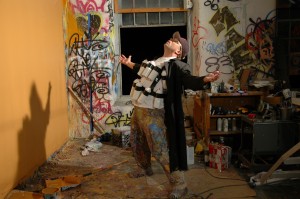
Can a piece of writing lead to someone detonating a bomb? Does art have the power to incite violent acts of terrorism? When does a piece of writing, or a painting, or a film cross the line from being art or journalism into an act of terrorism?
On June 23rd 2014, 3 journalists from the TV network Al Jazeera were sentenced to between 7 and 10 years in prison in Egypt on charges of terrorism for interviewing a named terrorist organisation. This sparked international outrage with many organisations condemning the arrests, but how do we define acts of terrorism? For this month’s Draw the Line event, Index on Censorship wants to know if you think creating something associated with terrorists can be terrorism?
We want to look at whether words or images can be weapons? Can a controversial article or artwork just be providing another side to the story? By suppressing works are we limiting free speech or protecting the public from incitements to hatred that could lead to violent acts of terrorism?
Join Index on Censorship for a lively debate where we will look at different cases of art and journalism being accused of terrorism and ask – where do you draw the line?
WHEN: Monday 4th August, 2.30pm
WHERE: Index on Censorship, 92-94 Tooley St, London, SE1 2TH
TICKETS: This event is FREE for under 25s, please RSVP here.
DRAW THE LINE is a new project for tomorrow’s leaders, artists, journalists and campaigners to get involved in fighting censorship: share your thoughts in the #IndexDrawtheLine discussion forum, take on the debate at our monthly events or contribute to our Young Writers / Artists programme. Tell us – where do you draw the line?
16 Jul 14 | Brazil, News and features, Religion and Culture
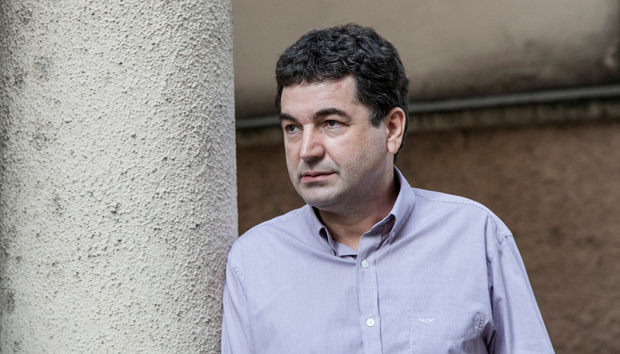
Journalist and historian Paulo César de Araújo, author of Roberto Carlos em Detalhes, was sued by the subject of his book. (Photo: Companhia das Letras)
Writing books and making movies about public figures without the need for prior authorisation is close to becoming a reality in Brazil. Until now, Article 20 of the Brazilian Civil Code (Law 10.406/2002) stated that: “The dissemination of writings, the transmission of the word, or the publication, display or use of the image of a person may be forbidden if it affects the honour, the good reputation or respectability, or if it is intended for commercial purposes”. Writing biographies in Brazil today is only possible with permission from the subject or their relatives. Fail to secure this, and the book in question could be banned; the same goes for documentaries, plays and films.
Last April, an important step was taken to end the censorship of unauthorised biographies and use of images of public figures. The Chamber of Deputies, the lower house of the Brazilian Congress, passed bill 393/2011. The so called “biographies’ law” allows the disclosure of biographical information of a person in the public eye without prior authorisation. The law changes the wording of Article 20, guaranteeing access to biographical information about individuals whose actions are of interest to the public.
According to the bill’s author, representative Newton Lima Neto of the Worker’s Party, the original article hurt the Brazilian constitution by establishing a system of prior censorship. “It talks about the need to remove the legal remnants of censorship and avoid the curtailment to the right to information, after years of dictatorship,” he says of the proposed new legislation.
The bill’s path to congress has not been smooth. In 2013, the issue reached the Supreme Federal Court (STF), the highest level of the Brazilian justice system. Minister Cármen Lúcia held a hearing to discuss the Direct Proceeding of Unconstitutionality 4815, a 2012 legal challenge brought by the National Association of Books Publishers (ANEL). This questioned Articles 20 and 21 of the civil code, claiming they were “incompatible with the freedom of expression and information”. It asked the Supreme Court to interpret the publication of biographies in accordance with the constitution, which ensures the right to freedom of expression and thought. Following the hearing the issue was to be assessed in congress, paving the way for the biographies’ law.
The Order of Lawyers of Brazil (OAB), the Brazilian Historical and Geographical Institute (IHGB), the Brazilian Academy of Letters (ABL) and Article 19 Brazil all support eliminating censorship of unauthorised biographies. A manifesto, signed by some of the biggest names in Brazilian literature, was launched in 2014 during the 16th Biennial Book Fair in Rio de Janeiro.
However, there are artists who do not support the adoption of the biographies’ law — as is the case with Grupo Procure Saber, which consists of internationally famous singers such as Caetano Veloso, Chico Buarque, Gilberto Gil, Milton Nascimento and Roberto Carlos (known as O Reior The King). The latter has left the group, but was involved in a noisy lawsuit against the author of an unauthorised biography of him, which Carlos argued this was to preserve his privacy.
The ban on biographies seems to be directly linked to the commercial issue of copyright. Referring to a proposal from Procure Saber for the subjects of biographies to get a share of the profits from book sales, Newton Lima told UOL News the group were “mixing the theme of freedom of expression, right to information, freedom of artistic creation, with the subject of copyrights”.
In 2006, Roberto Carlos sued journalist and historian Paulo César de Araújo, author of Roberto Carlos em Detalhes. There was a plea deal, but Carlos demanded that 11,000 copies were retracted from stores and for Araújo to be arrested. “He treated me like a criminal just because I did my job,” Araújo told the newspaper A Tarde. Speaking to Globonews Network, the writer revealed that Roberto Carlos’ first intention was to burn the books. “Today, he gave up, but the books are saved by security guards in his house,” he said. In another recent interview with TV Brasil, Araújo commented that Roberto Carlos sees his life story as private heritage. “Just as he has a car, he has his history'”, and he believes that writing about this history is like invading his property. With the agreement, the request for an indemnity and the accusation of wrongdoing against Carlos’ honour were withdrawn, and the case closed.
On 15 May this year, Carlos filed a petition to the Supreme Court to take part in the process of discussing publication of unauthorised biographies. The musician created the Instituto Amigo, to participate in the case as an amicus curiae. He went to court against the aforementioned challenge brought by ANEL. He stated, through his institute, that the changes in the biographies’ law “would hinder the right to repair damage to the honour and image” of subjects, and advocated “the prevalence to the right of privacy above the freedom of information”.
“It is an absurd moment in Brazil, where the constitution guarantees freedom, but we need to be careful,” Araújo said in an interview with Gaúcha Radio. “He [Carlos] did not read the book. He should read the book, because his history was built by thousands of Brazilians. If he had read, he would never sue me. But his lawyers wanted to earn money with the action.” Carlos’ defence team is led by Brazil’s most famous lawyer, Antônio Carlos de Almeida Castro — “Kakay” — who also defended culprits in the Mensalão corruption scandal, and is very sought after by politicians.
Araújo has written another book about Roberto Carlos/ O Réu e o Rei (The Accused and the King) talks about the lawsuit and has new information on the singer. It is in fact an unauthorised biography of the unauthorised biography. The book was launched on 22 May, but without an advertising campaign — “to avoid retaliations,” according to Araújo. “We await now that the senate can continue the progress of the biographies’ law,” the author wrote in his blog. The musician, meanwhile, has assured the press he will not sue Araújo again.
But biographical books are not the only censored material in Brazil. Di Glauber, a film about the life of Brazilian artist Di Cavalcanti has been banned for 34 year for violating Article 20. The film was awarded the Special Jury Prize at the 1979 Cannes Film Festival, and is considered one of the masterpieces of Brazilian and world cinema. The family of the painter had the biopic barred in Brazil. Family members have also put a stop to already written biographies about football players Garrincha and Pelé and singer Vinicius de Moraes, among others.
Lawsuits, copyrights, privacy, intimacy, what is really at stake? For journalist Daniel Feix, whose biography about the gaucho actor and singer Teixeirinha was banned, this is a matter of knowing how to live with freedom of expression and the free flow of information: “We still need to evolve in the way how we deal with the freedom of expression. We need to live better with the contradictory and take more responsibility in publishing information. The fact that we are a country that had our freedom cut for a long period in our history is charging a high price. We need to evolve the way we deal with freedom in every way.”
According to Feix, Brazil is a conservative and prejudiced country, but the approval of the biographies’ law is “an important step to bring the country to a higher stage in how people deal with freedom”.
“We are living in a very strange period in Brazil, where the absolute intolerance is increasingly present,” says award-winning writer Luiz Ruffato in an interview with Index. “It’s not just a matter of biographies,” he says. “I think that talking about biographies should not even be a topic of discussion in a free country.”
Another common theme among Brazilian writers is the confusion that exists between public and private. Journalist Eduardo Bueno “Peninha” is emphatic: “It is obvious, evident, screaming that biographies of public figures should be as public as the subjects are. Freedom for the biographies now!”
Peninha, author of an authorised biography, as well as a collection of books on the history of Brazil that has sold over 1 million copies, says there is no more privacy today: “After the revelations of Edward Snowden, and electronic espionage of the United States over the whole world, including the president of Brazil, where did privacy go to? It’s gone to the dogs now!”
The National Union of Books Publishers (SNEL) said it is pleased with the pressure on congress to approve the biographies’ law. The union’s President Sônia Machado Jardim, said that “the need for prior authorisation to publish biographies was a remnant of the dictatorship, unjustifiable in a democratic regime”. According to her, the law will protect the right to privacy, intimacy and honour, while ensuring access to information about notable figures in the history of Brazil and its culture, as envisaged in the constitution. “As the person becomes public, their history is intertwined with the country’s history; but when there are any restrictions on the publication of the stories of these personalities, the preservation of the history is lost. The matter is much bigger [than biographies]. It is to ensure knowledge of the history of Brazil for future generations,” she emphasises.
If approved by the senate, the biographies’ law or PLC42/2014, will go to President Dilma Rousseff for approval and enter into force on the date of its publication in the Diário Oficial da União. But there is an insidious comma in this story.
A last-minute amendment was added to the law when approved by the Chamber of Deputies. Representative Ronaldo Caiado (Democrats/DEM), added a third paragraph to Article 20, establishing that “the person who feels affected in their honour, good reputation or respectability” may request the section offensive to him or her to be excluded in future reproductions of the work.
The amendment does not prohibit works, sanction the arrest of writers or the seizure of books, as happened in the Roberto Carlos case. But rather than a prior censorship, this paragraph might allow public figures to censor excerpts in future editions of previously published works. “This might make the censorship more visible than ever”, wrote columnist Julio Maria to the newspaper O Estado de S. Paulo. “The previous censorship that exists today will turn into a posthumous censorship if the senate does not scrutinise the issue and get it out of this twilight zone.”
“We need to find a balance”, explained Caiado, in a public hearing in the Supreme Court in 2013, arguing that his amendment refers only to the exclusion of libellous, defamatory and untrue excerpts. In 2005, this same representative sued writer and journalist Fernando Morais over a sentence uttered by a source in his book A Toca dos Leões. The writer was ordered to pay £380,000 in compensation for moral damages.
The amendment was added discreetly, but could have a significant impact on the state of free expression in Brazil. As a Croatian media lawyer, quoted in the European Mapping Media Freedom project, points out, “these kinds of laws exist across the world, especially under the guise of protecting against insult. The problem, however, is that often such laws exist for the benefit of politicians and powerful. And when they are even more general, they can be very easily manipulated by those in positions of power to shut down and punish criticism”.
It will now be up to the senate to untie the impasse of the biographies’ law, before a form of censorship is legalised in Brazil just as another is eradicated.
More coverage of Brazil from Index
Brazil: Death of journalist covering protests prompts uproar
Brazil’s World Cup surveillance operation
Brazil: Bills rushed through congress in bid to suppress World Cup protests
Brazil’s opaque World Cup preparations roil protesters
Brazil moves to unmask protesters
This article was posted on July 16, 2014 at indexoncensorship.org
14 Jul 14 | France, Mapping Media Freedom
The decision not to air the last episode of Du Jour au Lendermain and recent budget cuts have critics up in arms over changes to the cultural arm of Radio France.
Alain Veinstein, a French writer and poet has been hosting the radio programme called Du jour au lendemain for 29 years on France Culture, a French public station dedicated to culture.
Olivier Poivre d’Arvor, director of France Culture, decided not to air Veinstein’s last show, dating from 4 July, unhappy that the host had decided to interview himself and not a writer, and to talk about what the end of his show meant to him. A programme dating from November was re-aired instead. Veinstein denounced “a rare case of censorship on the radio” while talking to Le Monde.
In the end, the director of France Culture decided to make the programme available online. In a 35 minute-long monologue, Veinstein explained he had learned by email that same morning that his programme would be discontinued.
“It would have been fine for him to say farewell for 3 minutes, even to express negative views on the fact his programme was discontinued. But my job is to make sure that the radio is not taken hostage. There was something obscene in explaining that after him it would be chaos”, Poivre d’Arvor told Libération.
“A public radio station is not a private one, nor a place to do a pro domo speech, not for Alain Veinstein or any of us. (…) Ensuring the renewal of generations on the radio is to strenghten France Culture’s future”, he continued.
Several personalities who have been working for Radio France for a long time – David Mermet, Ivan Levaï – have been dismissed recently, in a move that seems to show the new management of Radio France wants to appeal to a youth audience by employing younger presenters.
On the listeners forum, there were some very hostile reactions to Poivre d’Arvor’s decision.
“From someone who’s constantly reduced the importance of culture on France Culture radio to reinforce news, tacky sensationalism, while adding a dose of mediocre tourism, it’s a bit much to say this programme didn’t fit in”, wrote one commenter. Another listener added: “Why is Poivre d’Arvor deciding instead of the programme’s producer what is going to be of interest to the audience?”
In February, the Conseil national de l’audiovisuel (CSA), an institution whose role is to regulate the various electronic media in France, such as radio and television, named 37 year-old Mathieu Gallet as the new head of Radio France. Under the Sarkozy presidency, Gallet is known to have helped writing a law that enabled the French president to name the heads of public television. This power has now been returned to the CSA.
At the end of June, the management of France Culture announced a 7.5 per cent cut in the budget for all shows except news broadcasts. In a joint release, the society of producers of France Culture, France Inter and France Musique denounced the fragility of radio hosts, who are not France Culture employees but “intermittents du spectacle”. Veinstein discussed the “intermittent” status in his last programme.
Under French law, some 250,000 workers in the film, theatre, television and festival industry, known as intermittents, benefit from a system that pays them during periods when they do not work. Many of them have been keeping the pressure on during summer festivals, and went out on strke, as they are unhappy with a deal reached between some unions, employers and the government in March which would increase their payroll taxes.
As Veinstein put it in his Le Monde interview: “Night has fallen for good. Don’t ask me what tomorrow will be made of. Tomorrow is today without tomorrow (…) It’s been a beautiful day, all the same. Du jour au lendemain is entering the past.’
Recent reports from France via mediafreedom.ushahidi.com:
Accused of collecting data on journalists, Front National threatens them
Reporters Without Borders accuse businessman Bernard Tapie of interfering with the editorial content of his newly purchased newspaper, La Provence
This article was posted on July 14, 2014 at indexoncensorship.org
14 Jul 14 | Africa, Magazine, News and features, South Africa
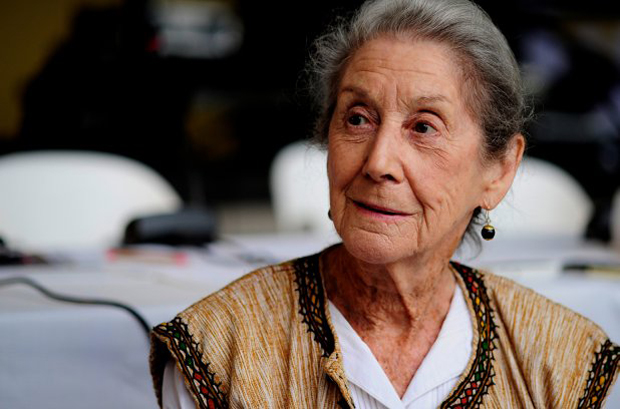
Index on Censorship remembers Nadine Gordimer, who died today at 90. The South African author, winner of the Nobel Prize for Literature and the Booker Prize among many other honours, was a long-time Index supporter and patron. She wrote for Index on Censorship magazine a number of times, including in its first year. Gordimer was also involved in the anti-apartheid movement, and much of her work deals with issues of politics and race. Three of her books – Burger’s Daughter, A World of Strangers, The Late Bourgeois World – were banned by the apartheid regime.
Ursula Owen was editor of Index magazine in 1994, when South Africa held its first free election. An issue of the magazine celebrated the historic event with an article by Gordimer, among others.
Owen said: “I remember visiting her in the late 90s, together with Adewale Maya Pearce, when I was running Index. We sat in her garden in Johannesburg. She was attentive and full of energy, and talked with great passion about what was going on in post-apartheid South Africa. Later we went to supper with Helen Suzman – an extraordinary experience to spend time in the same room with these two remarkable women. Awesome, as my granddaughters would say.”
Jayne Whiffin, publisher of Index magazine, said: “I am very sad to hear of Nadine Gordimer’s passing today. Nobody growing up in South Africa in the 1980s and 1990s could be unfamiliar with her work, and her short story, Message in a Bottle has great personal significance for me as the first piece of writing I encountered of hers while at school in South Africa. Her writing was an exemplar of how fiction can tell the truth even under the most strenuous forms of oppression, and she will be sorely missed both in South Africa and around the world.”
In celebration of her remarkable life, Index has created a collection of Gordimer’s articles that appeared in the magazine. These are free to read until 14 September.
Apartheid and censorship [1972]
Standing in the queue [1994]
Act two: one year later [1995]
Rushdie revisited [2008]
This article was posted on July 14, 2014 at indexoncensorship.org
14 Jul 14 | Draw the Line, Young Writers / Artists Programme, Youth Board
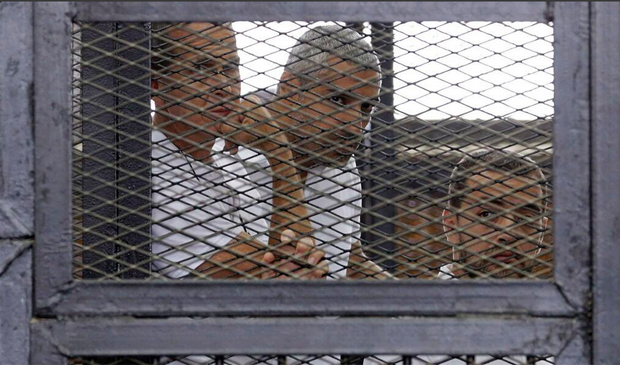
Three Al Jazeera journalists were among those sentenced to prison on terrorism charges.
In 1997, British journalist Robert Fisk interviewed Bin Laden. Fisk was not accused of being a terrorist, he was only doing his job. For decades, journalists have been interviewing terrorists, criminals and drug lords, because this is their job; to give a voice to everybody, whether they agree with them or not.
Last month, Egypt sentenced three Al Jazeera journalists to seven years in prison under the country’s anti-terrorism laws; they were accused of spreading false information, as well as supporting the now banned Muslim Brotherhood. In an extremely polarised political climate, giving a voice to the Muslim Brotherhood was deemed inciteful and inflammatory.
Art has been a means of stretching the boundaries, but can art sometimes be a public safety risk?
A series of cartoons, some of which depicted Prophet Mohammed, published by a Danish newspaper in 2005 sparked angry and violent protests across the Arab world. The same happened again when a 13 minute trailer of a movie called Innocence of Muslims appeared on Youtube two years ago. Earlier this year, French comic and political activist Dieudonné M’bala M’bala was banned from performing after his shows were found to incite racial hatred and anti-semitic sentiment by French courts. The comedian was also banned from entering the United Kingdom.
These cases raise a very important question: When does giving a platform to extremist views through art or journalism become an act of terrorism? Should artists or journalists be exempt from terrorism laws or should inflammatory works be banned?
Get involved the discussion using the hashtag #IndexDrawtheLine and tell us — where do you draw the line?
11 Jul 14 | Africa, News and features
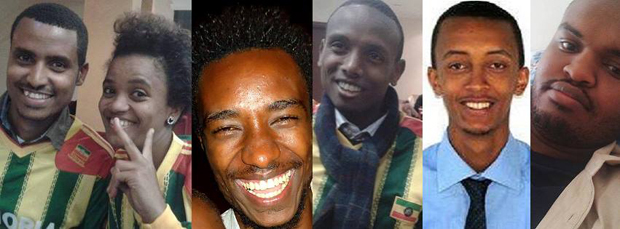
(Photo: Zone 9/Facebook)
“We blog because we care!” This is the slogan and rallying cry of Zone 9, a group of young Ethiopians writing about social and political issues in their country. For over two months however, blogging has been out of the question for most of them. In late April, six members of the group – which takes its name from an area of Addis Ababa’s notorious Kaliti prison, where several journalists are jailed – were arrested and have been detained since.
Befeqadu Hailu, Abel Wabela, Atnaf Berahane, Natnael Feleke, Mahlet Fantahun, Zelalem Kibret – all between the age of 25 and 32 – have been accused of “working with foreign organisations” and “receiving finance to incite public violence through social media”, but have yet to be formally charged. Journalists Edom Kassaye, Tesfalem Weldeyes and Asemamaw Hailegiorgis were also arrested for their alleged links to Zone 9. Tomorrow, several of them are due in court again.
The story of the case so far, as covered by the blog Justice Matters, makes for worrying reading. The group were initially taken to Maekelawi detention centre, where according to Human Rights Watch, political prisoners have been tortured. They have been prevented from communicating with lawyers and family members. Hearings have predominantly served to extend the police’s investigation period. Police have also appeared to move away from accusing them of conspiring with foreign organisations and towards a terrorism charge, under which other journalists have been sentenced.
Zone 9 have been active since May 2012 and this is not the first time the group has attracted the attention of the authorities. According to their Facebook page, their mission is to provide an “alternative independent narration of the socio-political conditions in Ethiopia and thereby foster public discourse that will result in emergence of ideas for the betterment of the Nation”. They have organised online campaigns, including #EthiopianDream, encouraging their fellow citizens to share messages “question[ing] themselves and discuss[ing] their dream for the country”.
Their work has proved unpopular with the government of Prime Minister Hailemariam Desalegn, who came to power following the death of long-time leader Meles Zenawi in 2012. The country’s leadership has continuously come under international criticism for its abysmal record on free expression and other human rights.
The majority of media is state-controlled or sympathetic to the government, with critical news outlets and journalists routinely targeted. Ethiopia is the world’s third worst jailer of the press, according to the Committee to Protect Journalists. The sweeping anti-terrorism legislation put in place in 2009 is often utilised to crack down on oppositional voices. Journalist Eskinder Nega publicly questioned the law and its implementation, only to be convicted to 18 years in prison under it in 2012.
Beyond crackdowns on press freedom, the country’s Muslim community has been hounded by the government, opposition protests are regularly banned, and foreign NGOs are not allowed to work on political and human rights issues.
Zone 9 was set up against this backdrop, and the group soon discovered the, too, were seen as a threat. The blog has been blocked and members have faced harassed at the hands of security services. Last September they took what would end up being a seven-month hiatus from publishing, due to the pressures connected to running the site. The six were arrested only days after announcing that they were to resume blogging.
Despite the fact that internet penetration in Ethiopia currently stands at around 1 per cent, authorities seems very aware of the web’s potential as a platform for free expression and, in turn, dissent. Paul Brown of BBC Monitoring believes the Zone 9 arrests “suggest that the government is taking online activism seriously – probably because elections are due next year.” There have even been reports of the government “training” internet users to post attacks on those who criticise authorities online and to post messages of support for the regime.
Zone 9 co-founder Endalkachew H/Michael recently spoke to CPJ from New York; he left Ethiopia to study in the US shortly before his colleagues were arrested. He says the government are trying to control the flow of information. “There is no plurality of voices in government and media. And they want to control that because there is a sort of plurality on the internet. If you go into the Ethiopian social media sphere, you see all kinds of comments about the government and opposition groups,” he explains.
The government, meanwhile, has denied any wrongdoing, saying the arrests are not connected to journalism but “serious criminal activity”.
“We don’t crack down on journalism or freedom of speech. But if someone tries to use his or her profession to engage in criminal activities, then there is a distinction there,” Getachew Reda, an adviser to the prime minister told Reuters.
But the story has drawn widespread condemnation, from international human rights organisations to news outlets to diplomats, with even US Secretary of State John Kerry calling it a “serious issue”. The hashtag #FreeZone9Bloggers has in the past few weeks accumulated outrage and solidarity from across the world. Endalkachew H/Michael says this attention in important. “I want the public to remain focused on this issue. The government is trying to make the public forget the human rights violations and journalists’ poor situation in Ethiopia.”
UPDATE 12 JUNE
According to Endalkachew H/Michael, following today’s hearing the case has been referred to a federal high court. The accused were reportedly not present for the hearing.
This article was posted on July 11, 2014 at indexoncensorship.org










